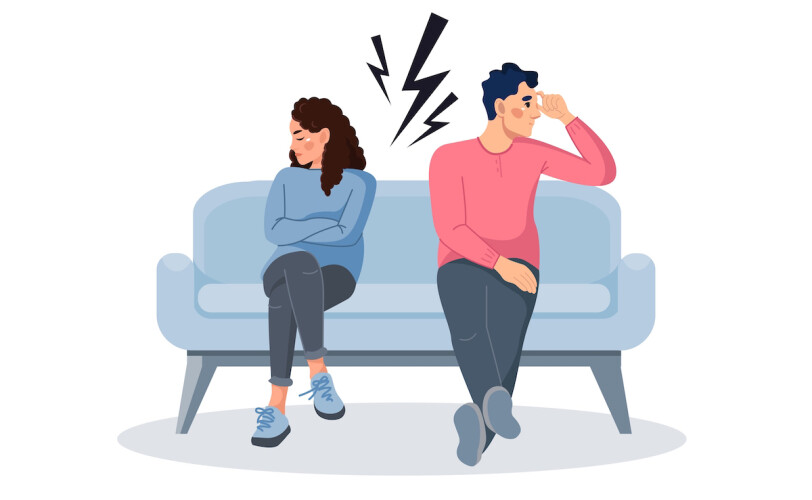Narcissistic abuse is a profoundly distressing experience that can have devastating effects on an individual’s mental and emotional well-being. Victims of narcissistic abuse often find themselves trapped in toxic relationships characterized by manipulation, control, and emotional turmoil. Fortunately, there is a way out – online therapy. In this blog, we will explore the concept of narcissistic abuse, its impact on survivors, and how online therapy can be an effective tool in helping survivors regain their sense of self and well-being
Contents
The Need for Therapeutic Intervention For Narcisstic Abuse
Narcissistic abuse is a pattern of behavior where one person, often a narcissist, exerts power and control over another through various manipulative tactics. These tactics can include gaslighting, emotional blackmail, and demeaning comments, leading to emotional and psychological trauma for the victim.
Victims of narcissistic abuse may experience a range of symptoms, including anxiety, depression, low self-esteem, and a constant feeling of walking on eggshells. Recognizing these signs is the first step toward seeking help.

The human experience encompasses a wide range of emotions, challenges, and triumphs. At times, individuals may find themselves struggling to navigate life’s complexities, facing mental health issues, emotional distress, or traumatic events. In these moments, the need for therapeutic intervention becomes essential.
Therapeutic intervention refers to the process of seeking help from qualified mental health professionals to address emotional, psychological, or behavioral issues. It involves various therapeutic approaches, techniques, and modalities tailored to an individual’s unique needs and circumstances. Therapeutic intervention is not limited to addressing mental disorders; it can also serve as a valuable resource for personal growth, self-discovery, and improving one’s quality of life.
Types of Online Therapy for Narcissistic Abuse
Online therapy has become a valuable resource for survivors of narcissistic abuse. It offers convenience, accessibility, and a safe space for survivors to heal and recover from the emotional and psychological trauma they’ve experienced. Here are some types of online therapy that can be effective for individuals dealing with narcissistic abuse:
Individual Psychotherapy:
- Cognitive-Behavioral Therapy (CBT): CBT is a widely used therapeutic approach that helps survivors identify and challenge negative thought patterns and beliefs instilled by the narcissistic abuser. It can also teach coping skills for managing emotional distress.
- Dialectical Behavior Therapy (DBT): DBT focuses on regulating emotions, improving interpersonal relationships, and developing mindfulness skills. It can be particularly helpful for individuals who struggle with emotional dysregulation due to narcissistic abuse.
- Trauma-Focused Therapy: For survivors with complex post-traumatic stress disorder (C-PTSD), trauma-focused therapies like Eye Movement Desensitization and Reprocessing (EMDR) can help process and heal from past traumas related to the abuse.
- Online Support Groups: Joining online support groups for survivors of narcissistic abuse can provide a sense of community and validation. These groups allow individuals to share their experiences, gain insights from others, and receive support from peers who understand what they’ve been through.
Art and Expressive Therapies:
- Art Therapy: Art therapy can be conducted online, allowing survivors to express their emotions and experiences through creative mediums like painting, drawing, or writing. This can be particularly beneficial for individuals who find it challenging to verbalize their feelings.
Mindfulness and Meditation:
- Mindfulness-Based Stress Reduction (MBSR): Online MBSR programs teach survivors mindfulness techniques to reduce anxiety and improve emotional regulation. Mindfulness can be a powerful tool for healing and self-awareness.
How Online Therapy for Narcissistic Abuse Works?

Online therapy for narcissistic abuse follows a structured process designed to provide survivors with support, validation, coping strategies, and healing. Here’s an overview of how online therapy for narcissistic abuse typically works:
- Finding a Therapist:
- Research: Survivors start by researching and identifying qualified therapists or counselors who specialize in narcissistic abuse and trauma. They can use online directories, therapist search engines, or recommendations from trusted sources to find potential therapists.
- Consultation: Many therapists offer free initial consultations, either through email, phone, or video call. During this consultation, survivors can assess whether the therapist is a good fit and discuss their specific needs and goals for therapy.
- Setting Up Online Therapy Sessions:
- Choosing a Platform: Therapists and survivors typically use secure and HIPAA-compliant telehealth platforms or video conferencing software for online therapy sessions. Survivors will need a computer, tablet, or smartphone with a stable internet connection and a private space for sessions.
- Scheduling: Survivors and therapists agree on a schedule that works for both parties. Online therapy offers flexibility, allowing sessions to take place during evenings, weekends, or whenever is most convenient.
- The Therapeutic Process:
- Assessment: In the first few sessions, therapists conduct assessments to gain an understanding of the survivor’s history, experiences, and specific challenges related to narcissistic abuse. This assessment helps tailor the therapy approach to the survivor’s needs.
- Psychoeducation: Therapists provide survivors with information about narcissistic abuse, its effects on mental health, and the recovery process. Understanding the dynamics of the abusive relationship is a crucial step in healing.
- Setting Goals: Survivors and therapists collaboratively set goals for therapy. These goals may include improving emotional regulation, building self-esteem, addressing trauma, or establishing healthy boundaries.
- Therapeutic Approaches: Therapists utilize evidence-based therapeutic approaches such as Cognitive-Behavioral Therapy (CBT), Dialectical Behavior Therapy (DBT), or trauma-focused therapies like Eye Movement Desensitization and Reprocessing (EMDR) based on the survivor’s needs.
- Emotional Processing: Survivors are encouraged to express their emotions, thoughts, and experiences related to the abuse. Therapists provide a safe and non-judgmental space for survivors to process their feelings and gain insights.
- Skill Building: Therapy often involves teaching survivors coping skills, assertiveness training, self-care techniques, and strategies for managing triggers and anxiety.
- Boundaries and Self-Empowerment: Survivors learn to set and maintain healthy boundaries, regain a sense of agency, and develop self-empowerment.
- Validation and Support: Therapists offer validation and support, reinforcing that survivors’ feelings and experiences are legitimate. This validation is instrumental in rebuilding self-esteem.
- Progress Tracking: Survivors and therapists regularly assess progress toward the established goals and adjust the therapy plan as needed.
Overcoming Challenges in Online Therapy
Online therapy has become a popular and effective mode of mental health support, but like any form of therapy, it can present unique challenges. Overcoming these challenges is essential to ensure a successful therapeutic experience for both clients and therapists. Here are some common challenges in online therapy and strategies to address them:
Technology Issues:
- Challenge: Technical glitches, poor internet connections, or issues with the video conferencing platform can disrupt the therapy session.
- Solution:
- Test technology beforehand to ensure it works smoothly.
- Have a backup plan, such as a phone call, in case of technical difficulties.
- Consider using a reliable, secure telehealth platform recommended by your therapist.
Privacy and Confidentiality:
- Challenge: Ensuring that the therapy environment is private and secure can be challenging, especially for clients who share living spaces.
- Solution:
- Find a quiet, private space for therapy sessions.
- Use headphones to maintain confidentiality.
- Talk to your therapist about any privacy concerns, and they can provide guidance.
Engagement and Focus:
- Challenge: It can be challenging to stay engaged and focused during online therapy, as distractions at home are more prevalent.
- Solution:
- Create a dedicated therapy space that minimizes distractions.
- Communicate with your therapist if you’re finding it hard to concentrate.
- Practice mindfulness techniques to stay present during sessions.
Non-Verbal Cues:
- Challenge: Online therapy may limit the therapist’s ability to pick up on non-verbal cues, which are crucial for understanding emotions.
- Solution:
- Use video rather than audio-only sessions whenever possible to convey facial expressions.
- Discuss non-verbal cues and body language explicitly with your therapist.
The Cost of Online Therapy

The cost of online therapy can vary significantly based on several factors, including the type of therapy, the qualifications of the therapist, the duration and frequency of sessions, and the geographic location of both the client and the therapist. Here are some key considerations regarding the cost of online therapy:
- Therapist Qualifications and Experience: Therapists with more years of experience, advanced degrees, or specialized certifications often charge higher fees for their services. However, their expertise can be particularly valuable for addressing complex issues.
- Session Duration and Frequency: The duration and frequency of therapy sessions can impact the overall cost. Standard sessions are typically 45-60 minutes, but some therapists offer extended sessions for an additional fee. The frequency of sessions (e.g., weekly, biweekly) also affects costs.
- Geographic Location: The cost of online therapy may differ based on where the therapist is located and where the client resides. Therapists in urban areas with higher living costs may charge more than those in rural areas.
- Insurance Coverage: Some health insurance plans cover a portion of the cost of therapy, including online therapy. Clients should check with their insurance providers to determine coverage and any out-of-pocket expenses.
- Sliding Scale and Reduced-Fee Options: Some therapists offer sliding scale fees, which are adjusted based on the client’s income or financial situation. This can make therapy more affordable for individuals with limited financial resources.
Conclusion
Online therapy offers hope and healing for survivors of narcissistic abuse, providing a safe and accessible path toward recovery. The journey to healing from narcissistic abuse is often challenging, but with the guidance of a qualified therapist and the support of a therapeutic community, survivors can rebuild their lives, regain their sense of self-worth, and move forward toward a healthier, more fulfilling future.
If you or someone you know is struggling with the effects of narcissistic abuse, consider exploring online therapy as a valuable resource on the path to recovery. Remember that healing is possible, and you don’t have to go through it alone. If you are looking for an affordable Online Therapy TherapyMantra can help: Book a trial Online therapy session.


